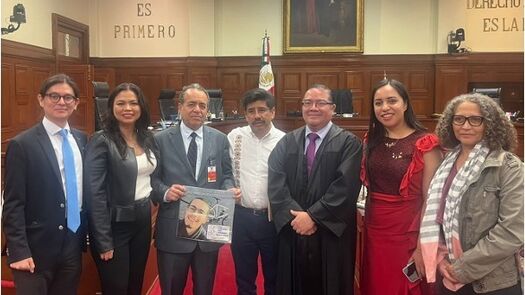December 19, 2025
Petro Korol, GHAI’s in-country advocacy coordinator based in Kyiv, Ukraine, describes the road safety program in Ukraine.
What’s the current situation like in Ukraine and what’s the road safety context?
February 24, 2023 will mark one year since Russia launched a large-scale military offensive against Ukraine. The territorial integrity, independence and peace of the country are under threat. Despite the war—in fact, partly because of it—public health advocates have redoubled their efforts to advance road safety and other policies that can protect health and save lives.
The war has forced many Ukrainians like myself to review their values, principles and views and realize that life and the right to safety for all are the most important now. The sad reality is that people in Ukraine die not only from Russian missiles but also lose their lives on the country’s roads. In 2022, the national police recorded a total of 18,628 road crash injuries and fatalities and in 2021 there were 20,300 road crashes. The number of crashes has gone down in part because the statistics from 2022 are from Ukrainian controlled territories only, but road safety remains a concern.
Road crashes overload various frontline services that are involved in defending the country: police officers who are trying to intercept Russian drones while ensuring Ukrainians have access to ambulances and emergency services, firefighters who are hurrying to save people and their homes after attacks. To save lives and support frontline workers, local partners (Center for Democracy and the Rule of Law (CEDEM) and U-Cycle) working alongside the Global Health Advocacy Incubator and Global Road Safety Partnership have adapted their road safety policy goals to address the current context. Despite the constant air raid alarms, missile attacks, blackouts, work from shelters and lack of internet connectivity, civil society managed to elevate the road safety agenda in the country.
What are the policies local partners are advocating for?
Our partner, CEDEM launched a successful advocacy campaign to push for the widespread adoption of the EuroProtocol process. EuroProtocol is a process used in some European countries to simplify the road crash documentation process, which reduces the workload of the police and clears cars from the roads more quickly. This process is used only for minor road crashes and the drivers involved in the crash work with their insurance companies to resolve who is at fault and the compensation amount. To reduce the burden on police of responding to minor road crashes, the Ukrainian government has increased the insurance compensation for drivers using the EuroProtocol process from 50,000 to 80,000 Ukrainian Hryvnia, which is equivalent to $1,360- $2,177.

Expert discussion event “Road Safety in Ukraine: Victories and New Challenges in the Conditions of War” that was held during Road Safety Week.
Another key advocacy issue local partners are calling for is the creation of emergency corridors or lanes for police, ambulance and other emergency vehicles. These types of lanes exist in other European countries and will help healthcare and other frontline workers save lives and protect Ukrainians. In order to establish these lanes, advocates are collaborating with the Ministry of Infrastructure to revise the traffic rules to allow for specialized emergency lanes.
Lastly, speeding is the among the leading causes of road crash injuries and deaths in Ukraine. According to the National Police, in the last 12 months, 45% of these crashes have occurred because of speeding. To address this issue, advocates are urging parliament to adopt legislation to establish a demerit points system. This system would discourage drivers from repeatedly violating speed limit laws and drivers that accumulate points would see their car insurance rates rising, mandatory driver’s education courses or suspension of their driver’s license.
All three of these advocacy efforts help to maintain a steady drumbeat of road safety for all in the face of a new political context. Ukrainian road safety organizations are doing their best to strengthen their country’s roads, save lives and uphold the right to road safety for all.



